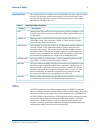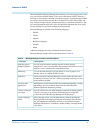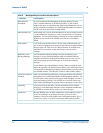
Features of AUDIX 4
Overview for Avaya IP600 Internet Protocol Communications Server
555-233-001 — Issue 5 — November 2000
36
Multilingual support Optional multilingual functions allow callers to interact with the AUDIX application
using different languages. For example, callers can follow voice prompts in languages
that may or may not match the language of the people they are calling. An
administrator can install up to 9 languages on the AUDIX application and operate
them simultaneously.
Users can also record personal greetings in two different languages. Prompts are
delivered in the selected languages.
Customized
announcements
Announcements comprise sets of spoken instructions or voice prompts in the AUDIX
Voice Messaging application. For example: “To access your mailbox, press star R.”
Voice mailbox
A mailbox is a storage area on a computer disk for messages, personal greetings, and
mailing lists. AUDIX users acquire a mailbox when they are administered on the
application. Each user accesses this mailbox with a private password.
Callers can leave messages in a user’s mailbox, but cannot perform other operations
related to the user’s mailbox. After a user logs in, the feature voices the name of the
user and reports the number of new messages received. Each message consists of a
message header and a message body.
Incoming mailbox Mailboxes are divided into two sections, the incoming mailbox, and the outgoing
mailbox. The incoming mailbox receives messages from other users, from the
AUDIX application, and from callers redirected to the mailbox because no one
answered. The user can save, delete, reply to, or forward messages. There are three
categories of incoming messages: New, Unopened, and Old. Table 4 describes each
category.
The system administrator can set the order in which these categories are played to the
user.
Table 4. Incoming mailbox categories
Category Description
New A message and header that a user has not listened to. The Message
Waiting Indicator (MWI) on the user’s telephone turns on when a
new message is present and turns off after the user has listened to
it.
Unopened A message where the header, but not the message itself, has been
listened to. The MWI does not stay on for this type of message.
Old A message that the user has listened to but not deleted.


















